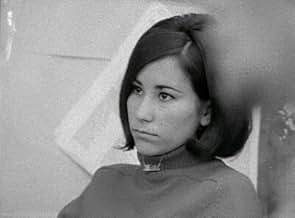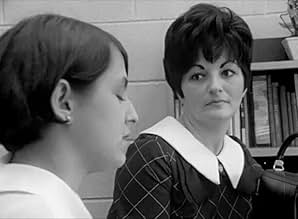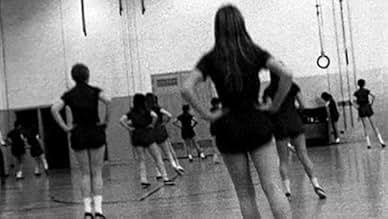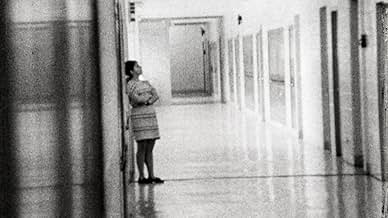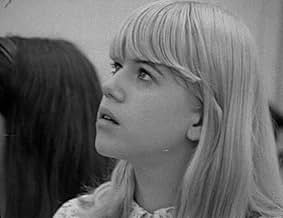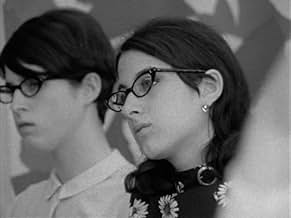IMDb RATING
7.5/10
2.4K
YOUR RATING
Documentary filmmaker Frederick Wiseman takes us inside Northeast High School as a fly on the wall to observe the teachers and how they interact with the students.Documentary filmmaker Frederick Wiseman takes us inside Northeast High School as a fly on the wall to observe the teachers and how they interact with the students.Documentary filmmaker Frederick Wiseman takes us inside Northeast High School as a fly on the wall to observe the teachers and how they interact with the students.
- Director
- Awards
- 1 win total
Featured reviews
Quite a remarkable study of an anonymous high school. Wiseman's strength in this film is definitely editing. He has taken seemingly a mountain of footage from probably a year in a high school and selected choice bits to make a film that completely engages, despite the apparent lack of character development and traditional narrative. The scenes and moments are incredibly interesting and glue you to the screen. Some of the best treasures are in the tiny concrete room where kids argue about their detentions. A teacher shows girls how to strut their stuff, and boys learn all about sex from a jolly gynecologist.
If you can get your hands on a copy of this, sit back and enjoy!
If you can get your hands on a copy of this, sit back and enjoy!
I just tripped over this review and was brought back by the comment from geprescott in 2003. I was also a student at Northeast High School, graduating in 1970.
What I do remember about the pieces I saw was they were real but not quite true. These are images from long ago, but there was something of the fact that most teachers were trying and not intending to be caricatures as I remember them appearing in the film.
What really got me to write was the description of the disciplinarian dean. I also had him as a 12th grade history teacher. Everything said about him by geprescott was very accurate. Our class was not required to read the Sunday New York Times, but I remember the year long project was to choose a country, research it, and then write its foreign policy. I picked the Soviet Union, did my research, and wrote a paper aimed at making life as difficult as possible for the US. I don't remember the actual comments but I remember being pleased with the final grade.
I never saw this entire film and am not sure where to find it now. I'd like to watch it with my kids.
What I do remember about the pieces I saw was they were real but not quite true. These are images from long ago, but there was something of the fact that most teachers were trying and not intending to be caricatures as I remember them appearing in the film.
What really got me to write was the description of the disciplinarian dean. I also had him as a 12th grade history teacher. Everything said about him by geprescott was very accurate. Our class was not required to read the Sunday New York Times, but I remember the year long project was to choose a country, research it, and then write its foreign policy. I picked the Soviet Union, did my research, and wrote a paper aimed at making life as difficult as possible for the US. I don't remember the actual comments but I remember being pleased with the final grade.
I never saw this entire film and am not sure where to find it now. I'd like to watch it with my kids.
"High School" is enthralling in one sense; if you are obsessed with the mundane "American Splendor" of generations past, then you will adore this documentary. For its time, it was brilliantly avant garde and remains so even today for its muted commentary on administration and the growing disparity between older generations and the younger high schoolers of the late 60's.
There is something purely amazing in viewing such settings in this vignette as they were, undoctored by Hollywood's lens. I am fascinated by the details of a time that I will never know personally and "High School" provides a brief glimpse into the mindset of the young adults of 1969 who are not unlike ourselves.
If you dig documentaries, please give this one a shot. Maybe you'll become as obsessed with "High School" as I have.
There is something purely amazing in viewing such settings in this vignette as they were, undoctored by Hollywood's lens. I am fascinated by the details of a time that I will never know personally and "High School" provides a brief glimpse into the mindset of the young adults of 1969 who are not unlike ourselves.
If you dig documentaries, please give this one a shot. Maybe you'll become as obsessed with "High School" as I have.
10kamerad
Lately I've been exploring the issue of ethics in the films of Fredrick Wiseman. In my entry on "Titticut Follies", among other things, I discussed how Wiseman's clear judgmental stance might be considered by some to be a breach of documentary ethics. Some feel that the goal of documentary is to be as objective as possible, others feels that it should be used as a tool for social change. Wiseman falls somewhere in the middle.
Wiseman has stated that with "Titticut Follies" and his next film, "High School", he had more of a fixed idea of what he was trying to go for (as opposed to his later, more thematically ambiguous films). But even so, that does not mean that the individual member of the audience cannot get what he or she wants out of what has just been seen. In a 1998 interview with "The Boston Pheonix", Wiseman stated: "When [High School] was first shown in Boston, in 1969, one of the people who saw it was a very conservative member of the Boston School Committee. I thought she'd hate the movie. But she came up and said, 'Mr. Wiseman, that was a wonderful high school!' I thought she was kidding me until I realized she was on the other side from me on all the value questions. Everything I thought I was parodying, she thought was great. I don't think her reaction represents a failure of the film. Instead, we have an illustration that reality is ambiguous, a complex mirror that the 'real' film takes place where the mind of the viewer meets the screen. It's how the viewer interprets the events."
In the above case, it would seem that the film is only unfair if you dislike what you see. The woman disagreed with what Wiseman was saying, but she still liked the film, because she felt that the images were strong enough to counter what Wiseman's intentions for the film were. So then does it really matter if he was "parodying" his subjects?
Of course we could look deeper into a film like "High School", at more minute details, to see better, less broad examples of what could be considered unethical practices. In one scene, a teacher teaches a class and we see a close-up of her face, wearing thick, horn-rimmed glasses. About this shot, Calvin Pryluck writes, "One can wonder how the teacher in High School feels about herself since seeing herself seeing her bottle-thick eyeglass lenses larger than life on the screen." Small matters like this are important. But is the woman's appearance Wiseman's problem? Perhaps he chose the close up to emphasize the look on her face. Perhaps then if the woman feels embarrassed, then that is for her to worry about, no one else.
Wiseman has stated that with "Titticut Follies" and his next film, "High School", he had more of a fixed idea of what he was trying to go for (as opposed to his later, more thematically ambiguous films). But even so, that does not mean that the individual member of the audience cannot get what he or she wants out of what has just been seen. In a 1998 interview with "The Boston Pheonix", Wiseman stated: "When [High School] was first shown in Boston, in 1969, one of the people who saw it was a very conservative member of the Boston School Committee. I thought she'd hate the movie. But she came up and said, 'Mr. Wiseman, that was a wonderful high school!' I thought she was kidding me until I realized she was on the other side from me on all the value questions. Everything I thought I was parodying, she thought was great. I don't think her reaction represents a failure of the film. Instead, we have an illustration that reality is ambiguous, a complex mirror that the 'real' film takes place where the mind of the viewer meets the screen. It's how the viewer interprets the events."
In the above case, it would seem that the film is only unfair if you dislike what you see. The woman disagreed with what Wiseman was saying, but she still liked the film, because she felt that the images were strong enough to counter what Wiseman's intentions for the film were. So then does it really matter if he was "parodying" his subjects?
Of course we could look deeper into a film like "High School", at more minute details, to see better, less broad examples of what could be considered unethical practices. In one scene, a teacher teaches a class and we see a close-up of her face, wearing thick, horn-rimmed glasses. About this shot, Calvin Pryluck writes, "One can wonder how the teacher in High School feels about herself since seeing herself seeing her bottle-thick eyeglass lenses larger than life on the screen." Small matters like this are important. But is the woman's appearance Wiseman's problem? Perhaps he chose the close up to emphasize the look on her face. Perhaps then if the woman feels embarrassed, then that is for her to worry about, no one else.
Frederick Wiseman is, of course, one of the best documentary film-makers, a wonderfully evocative but not manipulative cinema verite director who has consistently been making quality documentaries for several decades. "High School" is now available from Zipporah films, albeit for a higher price than many films ($35), and it is arguably his most accessible feature.
Wiseman has directed several films that run longer than three hours, mind-numbingly intense documentaries which fiercely tear into their subject matter and are nearly completely thematically ambiguous, but "High School" is more a straightforward documentary, reminiscent in places of the sort of film the Maysles Brothers made, and of "Titicut Follies", perhaps the only other Wiseman film with a definitive approach to the subject matter. The film doesn't feature the sort of objectivity some of Wiseman's other films do, and even the sequel to this feature, "High School II", which looked at a 90's high school, is far more ambiguous and much longer than this lean 75-minute feature, but around as good.
Still, the film is not marred by simplistic messages and a preachy attitude. Wiseman's films, as they normally do, allow a remarkably candid, voyeuristic experience for the audience, letting us see some of the social attitudes of the era as well as capturing the timeless feel of the high school experience. In what is perhaps the film's greatest scene a teacher formally recites "The Dangling Conversation" by Simon and Garfunkel, then plays the song for the class. You see small mannerisms change, the teacher suddenly has a hopeful look in her eyes rather than one of a tired educator, and Wiseman brilliantly captures the class's reaction without the scene ever feeling contrived or forced. It's just the sort of scene that Wiseman does perfectly, asking the audience to interpret the images for themselves, never overstepping his boundaries and preaching to the audience.
"High School" is almost certainly Wiseman's most accessible film. At 75 minutes in length it goes by quite fast and although it isn't necessarily designed as entertainment it is more or less easy to watch except for those who had traumatic high school experiences. "High School II" is a more complex and ambitious film (and, of course, seen by far fewer people), but "High School" might have the edge in terms of just how effective and lean it is. It's a perfectly-structured documentary with a stunning final scene, and may be one of my favorite films.
10/10
Wiseman has directed several films that run longer than three hours, mind-numbingly intense documentaries which fiercely tear into their subject matter and are nearly completely thematically ambiguous, but "High School" is more a straightforward documentary, reminiscent in places of the sort of film the Maysles Brothers made, and of "Titicut Follies", perhaps the only other Wiseman film with a definitive approach to the subject matter. The film doesn't feature the sort of objectivity some of Wiseman's other films do, and even the sequel to this feature, "High School II", which looked at a 90's high school, is far more ambiguous and much longer than this lean 75-minute feature, but around as good.
Still, the film is not marred by simplistic messages and a preachy attitude. Wiseman's films, as they normally do, allow a remarkably candid, voyeuristic experience for the audience, letting us see some of the social attitudes of the era as well as capturing the timeless feel of the high school experience. In what is perhaps the film's greatest scene a teacher formally recites "The Dangling Conversation" by Simon and Garfunkel, then plays the song for the class. You see small mannerisms change, the teacher suddenly has a hopeful look in her eyes rather than one of a tired educator, and Wiseman brilliantly captures the class's reaction without the scene ever feeling contrived or forced. It's just the sort of scene that Wiseman does perfectly, asking the audience to interpret the images for themselves, never overstepping his boundaries and preaching to the audience.
"High School" is almost certainly Wiseman's most accessible film. At 75 minutes in length it goes by quite fast and although it isn't necessarily designed as entertainment it is more or less easy to watch except for those who had traumatic high school experiences. "High School II" is a more complex and ambitious film (and, of course, seen by far fewer people), but "High School" might have the edge in terms of just how effective and lean it is. It's a perfectly-structured documentary with a stunning final scene, and may be one of my favorite films.
10/10
Did you know
- TriviaThis film was selected to the National Film Registry, Library of Congress, in 1991.
- Quotes
Male Authority Figure: It's nice to be individualistic, but there are certain places to be individualistic.
Female Student: I didn't mean to be individualistic.
Male Authority Figure: No, I'm not criticizing!
- ConnectionsFollowed by High School II (1994)
- Soundtracks(Sittin' On) The Dock of the Bay
(uncredited)
Written by Steve Cropper and Otis Redding
Performed by Otis Redding
- How long is High School?Powered by Alexa
Details
- Release date
- Country of origin
- Official sites
- Languages
- Also known as
- Student Affairs
- Filming locations
- Production company
- See more company credits at IMDbPro
- Runtime
- 1h 15m(75 min)
- Color
- Sound mix
Contribute to this page
Suggest an edit or add missing content

